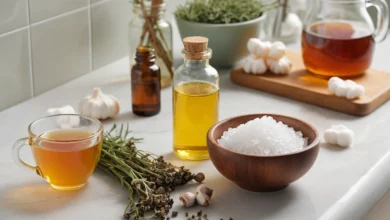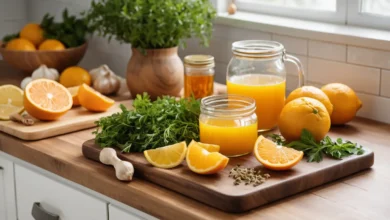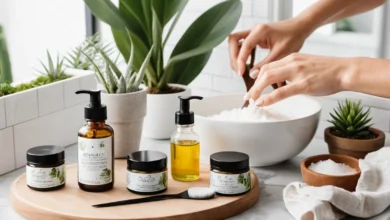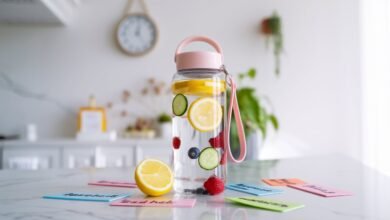Rid Yourself of Bloating with These Easy Fixes: Simple Solutions to Feel Your Best

Bloating can be uncomfortable, frustrating, and downright painful. Whether it’s from overeating, a sluggish digestive system, or certain foods, dealing with bloating can make you feel sluggish and self-conscious. Fortunately, there are simple, effective ways to get rid of bloating quickly and safely, using natural remedies and lifestyle changes. In this article, we’ll dive into easy fixes that can help you beat bloating and feel more comfortable in your own skin.
1. Drink More Water to Reduce Bloating
One of the most common causes of bloating is water retention. While it may seem counterintuitive, drinking more water actually helps reduce bloating by flushing excess sodium out of your system. Staying hydrated ensures that your digestive system is functioning properly and that your body doesn’t hold onto excess water.
How to Use:
- Aim to drink 8-10 cups of water per day.
- Add a few slices of lemon or cucumber to your water to enhance its diuretic effects.
- Herbal teas, such as peppermint or chamomile, can also help soothe bloating and aid digestion.
2. Try Ginger to Soothe Your Stomach
Ginger has been used for centuries to alleviate digestive discomfort, including bloating. It contains compounds that stimulate digestive enzymes and promote the smooth movement of food and gases through the digestive tract, helping to reduce bloating naturally.
How to Use:
- Drink fresh ginger tea made from a few slices of ginger steeped in hot water.
- Add grated ginger to smoothies or stir-fries.
- Try ginger supplements if you want a more concentrated dose.
3. Avoid Carbonated Drinks
Carbonated drinks, including soda and sparkling water, can contribute to bloating by releasing carbon dioxide gas into your stomach. This gas can lead to uncomfortable feelings of fullness and bloating. If you tend to feel bloated often, it’s best to limit or avoid these beverages altogether.
How to Use:
- Replace sodas and carbonated drinks with water, herbal teas, or infused water.
- If you miss the fizz, try sparkling water without added sugars or artificial sweeteners.
- Opt for flat beverages that are easier on the stomach.
4. Eat Smaller, More Frequent Meals
Large meals can stretch the stomach and lead to bloating, especially if they are heavy or high in fat. Instead of eating big meals, try eating smaller portions throughout the day. This allows your digestive system to process food more efficiently and can prevent feelings of fullness and bloating.
How to Use:
- Eat 4-6 smaller meals throughout the day instead of 2-3 large meals.
- Focus on lean proteins, whole grains, and vegetables for digestion-friendly meals.
- Chew food slowly to avoid swallowing excess air, which can contribute to bloating.
5. Incorporate Probiotics for Gut Health
Probiotics are beneficial bacteria that can help balance your gut microbiota, improving digestion and reducing bloating. An imbalance in gut bacteria can lead to digestive issues, including bloating and gas. Adding probiotic-rich foods or supplements to your diet can support a healthier digestive system.
How to Use:
- Include yogurt, kefir, and sauerkraut in your diet for a natural source of probiotics.
- Take probiotic supplements if you find it difficult to consume enough fermented foods.
- Look for probiotic-rich beverages and snacks that can help restore balance to your gut.
6. Limit Sodium Intake
Too much sodium in your diet can cause your body to retain water, leading to bloating. Processed foods, canned goods, and salty snacks are often high in sodium and should be consumed in moderation. Opt for fresh, whole foods to avoid excess salt and to reduce bloating.
How to Use:
- Limit processed and fast foods, which are typically high in sodium.
- Choose low-sodium versions of canned goods and packaged products.
- Season food with herbs and spices like garlic, basil, and thyme instead of salt.
7. Take a Walk After Eating
Physical activity can help stimulate digestion and move gas through the digestive tract, reducing bloating. A gentle walk after meals can be an effective way to promote digestion without putting unnecessary strain on your body.
How to Use:
- Take a 10-15 minute walk after meals to promote digestion.
- Engage in light stretching or yoga poses that encourage gas release, such as child’s pose or seated twists.
- Avoid lying down immediately after eating, as this can slow digestion and worsen bloating.
8. Avoid Certain Gas-Producing Foods
Some foods are known for causing bloating and gas. While they are nutritious, they can be difficult for some people to digest. Common culprits include beans, cruciferous vegetables (such as broccoli, cabbage, and cauliflower), and dairy products. If you’re prone to bloating, reducing or eliminating these foods may provide relief.
How to Use:
- Limit intake of beans, lentils, and certain vegetables like broccoli and cauliflower.
- If you’re sensitive to dairy, try lactose-free options or non-dairy substitutes like almond or oat milk.
- Experiment with a low FODMAP diet, which eliminates certain fermentable carbohydrates that contribute to bloating.
9. Massage Your Stomach to Release Gas
A gentle abdominal massage can help stimulate your digestive system and relieve the discomfort caused by bloating. Massaging in a circular motion encourages the movement of gas and promotes better digestion.
How to Use:
- Use your fingers to gently massage your stomach in a clockwise direction.
- Apply gentle pressure around the area of discomfort, focusing on the lower abdomen.
- Try this massage for 5-10 minutes to help ease bloating and gas.
10. Try Fennel Seeds for Bloating Relief
Fennel seeds have long been used in traditional medicine to relieve bloating and improve digestion. They contain compounds that help relax the muscles in the gastrointestinal tract and relieve gas and bloating.
How to Use:
- Chew on fennel seeds after meals to help prevent bloating.
- Make fennel tea by steeping the seeds in hot water for 10 minutes.
- Add fennel seeds to your diet by sprinkling them on salads or soups.
Frequently Asked Questions About Bloating
1. Why do I feel bloated after every meal?
Bloating after meals could be caused by eating too quickly, overeating, or consuming foods that are hard to digest. If you’re experiencing frequent bloating, try eating smaller meals, chewing your food thoroughly, and avoiding gas-producing foods.
2. How can I prevent bloating during travel?
Travel can affect your digestion due to changes in routine, diet, and hydration. To prevent bloating, stay hydrated, limit salty foods, avoid carbonated drinks, and walk around to keep your digestive system moving.
3. Is bloating a sign of a serious health condition?
Occasional bloating is usually harmless, but chronic or painful bloating could be a symptom of a more serious condition like IBS, food intolerances, or digestive disorders. If you experience persistent bloating, it’s best to consult a healthcare provider.
Conclusion
Bloating is a common issue, but it doesn’t have to be a constant source of discomfort. By incorporating simple fixes like drinking more water, eating smaller meals, trying natural remedies like ginger and fennel, and avoiding certain foods, you can relieve bloating and feel better in no time. Remember, consistency is key—small lifestyle changes can have a big impact on your digestive health and overall comfort. Say goodbye to bloating and hello to a more comfortable, confident you!





